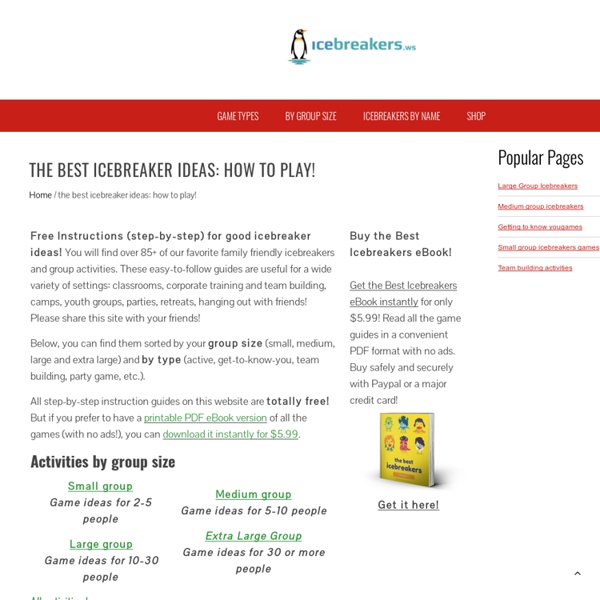



A Comprehensive Framework For Student Motivation A Comprehensive Framework For Student Motivation by Terry Heick When researching student motivation and gamification late last year, I came across the most comprehensive gamification framework I’ve ever seen. Developed by gamification expert Yu-kai Chou, it was an ambitious effort that distinguished black hat gamification (which is “bad”–think Farmville and Candy Crush) from white hat gamification (which is “good”–think Minecraft or even an ACT score). (It’s also copyrighted, but they graciously allowed us to use it.) While it is designed not as an educational framework, but rather as a way to demonstrate gamification and its many strands, gamification is about human encouragement and motivation.
Calaméo - Pinacle Pilori Pinacle-Pilori PRINCIPE Cette technique combinée associe l’analyse défectuologique et la pensée positive afin de réaliser un diagnostic partagé. Ces 2 méthodes Pinacle et Pilori peuvent également être utilisées séparément. UTILISATION Dans la... More Pinacle-Pilori PRINCIPE Cette technique combinée associe l’analyse défectuologique et la pensée positive afin de réaliser un diagnostic partagé. Ces 2 méthodes Pinacle et Pilori peuvent également être utilisées séparément. Bob the Builder Utilizziamo i cookies sui nostri siti e sulle nostre applicazioni per dispositivi mobili per diversi motivi, ad esempio per migliorare l'esperienza degli utenti sul sito, gestire la pubblicità, analizzare i nostri siti e le relative applicazioni. Un cookie è un piccolo file di testo che viene salvato sul computer degli utenti o sui dispositivi mobili quando visitano un sito o utilizzano una app. Clicca qui per saperne di più sui cookie utilizzati e su come configurare le impostazioni del browser dei dispositivi mobili o gestire i cookies. Utilizzando il nostro sito o le nostre app, l'utente accetta l'uso che facciamo dei cookies, salvo il caso in cui disabiliti i cookies.
The Montessori Method: An Education For Creating Innovators Imagine an education system that trained students to be creative innovators and leaders without the use of grades, tests or homework. It actually exists and it’s called the Montessori Method. The Montessori Method focuses on fostering a hands-on, self-paced, collaborative and enjoyable learning experience. It teaches students to start small with their ideas, to build them through experimentation and to solve the problems that come up along the way with a sense of stimulating curiosity. One of the most striking aspects of Montessori education is its similarities with the “fail fast, fail forward” do-it-yourself hacker mentality that has built many of the most innovative companies in Silicon Valley.
Sebran's ABC - free software for kids It's never too early for your child to become familiar with letters and numbers. Sebran's ABC's colorful pictures, pleasant music, and gentle games teach letters, numbers, simple math, and rudiments of reading. The program teaches using either Afrikaans, Bahasa Indonesian, Breton, Catalan, Croatian, Czech, Danish, Dutch, English, Estonian, Finnish, French, German, Greek, Hungarian, Icelandic, Italian, Lithuanian, Norwegian, Polish, Portuguese, Romanian, Samoan, Slovak, Slovenian, Spanish, Turkish, Swahili or Swedish (in Swedish, the droll zebra gracing the main screen is called "sebran"). The six simpler exercises display four possible answers. Choose the right one and it becomes a smile; an error gets a frown and a chance to try again.
Sensory Systems that Make up the Learning Hierarchy of a Strong Academic Foundation - Integrated Learning Strategies This article contains information regarding important sensory systems and the learning hierarchy that comes from developing each one. Affiliate links are included for your convenience. Whether a child is using his or her hands to write, ears to listen, eyes to read, or their entire body to play sports, they can execute and learn best when they are active and using all of their senses to the fullest. When a child’s brain directs the body to sequence and perform motor tasks this is called motor planning.
35 Educational Resources to Encourage Inquiry & Inventive Thinking This is a sponsored post. I’ve scoured the internet, including all of my favourite social media sites, to bring you a fantastic collection of online inquiry and inventive thinking resources that I know will inspire and motivate both you and your students. The collection includes Lego, science, practical activity ideas, engineering, videos, animation, technology and a tonne of fun facts – so there is sure to be something for everyone!
Create Videoquizzes - Educaplay The educational content that exists today on the Internet is extensive. Specifically, YouTube has a significant amount of high-quality educational videos. The Video Quiz activity gives you the ability to intersperse interactive questions throughout a YouTube video. It also allows you to combine several videos into one new video. The activity is a sequence of video segments, each followed by a question that prompts the user for a response.